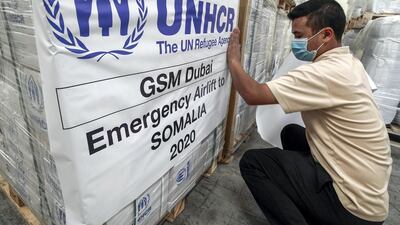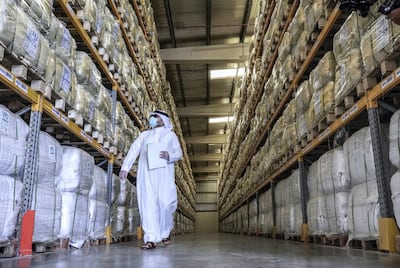The UAE has sent vital aid to Somalia to help thousands of flash flood victims and provide medical supplies for Covid-19 patients.
A flight bound for Mogadishu left the Emirates on Tuesday, with more than 35 tonnes of life-saving equipment on board.
The aircraft was chartered at the request of Sheikh Mohammed bin Rashid, the Vice President and Ruler of Dubai.
More than half a million Somalis have been affected by either climate-related disasters or internal conflict this year.
“We fear that these emergencies, combined with the spread of Covid-19, will lead to devastating consequences unless there is a strong and coordinated response from the international community and humanitarian actors,” said Nadia Jbour, head of the United Nations Refugee Agency (UNHCR) office in the UAE.
“Through the kind support by the International Humanitarian City [a humanitarian logistics hub] and His Highness Sheikh Mohammed bin Rashid, UNHCR will be able to effectively respond and provide an immediate assistance to the affected population.”
Somalia declared a national emergency in February following the largest locust swarm seen in East Africa in 25 years.
The infestation destroyed thousands of crops, including those in neighbouring countries such as Ethiopia.
Ongoing internal conflict in the state has also contributed to its dire need for assistance, as has recent flash flooding which has left tens of thousands of people without shelter and food.
On Tuesday, UNHCR said it had sent supplies including Jerry cans, soap, blankets, sleeping mats, kitchen sets and plastic sheets.
Officials said about 6,500 people displaced by the flooding would benefit from the aid.
Meanwhile, the World Health Organisation (WHO) said it had sent ventilators and other medical equipment for those suffering from Covid-19.
“If current trends continue, this year’s rains give every indication that they could pose the same catastrophic threat…of 2019, which led to more than 400,000 people being forced to flee their homes,” said Charlie Yaxley, a UNHCR spokesman.
“Swarms of desert locusts, the most destructive migratory insect in the world, threaten to decimate crop yields and cause widespread food shortages.”
Humanitarian organisations also fear an increase in the spread of Covid-19 in Somalia because of its combination of emergencies.
As of May 11, there were 1,089 cases recorded in the country, resulting in 52 deaths.
“The government of Somalia has initiated Covid-19 testing across the country,” said Mr Yaxley.
“However, decades of conflict, together with a global shortage of testing kits, has left the country’s health infrastructure in a precarious position to respond should the virus spread rapidly.”
Last month, the UAE sent a plane carrying 27 tonnes of medical supplies to Somalia in collaboration with WHO.
Seven tonnes were provided by the Emirates and the remaining supplies by WHO.
On April 13, the UAE also sent 15 tonnes of aid to Ethiopia, as well as three tonnes to the African Union.



